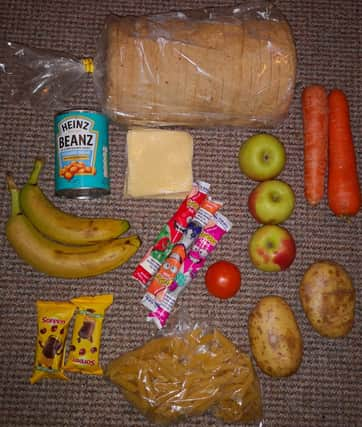‘It falls short of our hamper specification’ - Chartwells catering firm’s response to ‘unacceptable’ food parcel


The UK Government is under fire again over free school meals, after images of food parcels shared online appear to show around £5 worth of food, despite each parcel costing the taxpayer £30.
Twitter user @RoadsideMum shared an image of the food parcel she had been sent, which was intended to provide enough for lunch for 10 days.
Advertisement
Hide AdAdvertisement
Hide AdThe parcel, supplied by catering firm Chartwells, contained a loaf of bread, a tin of beans, two bananas, two carrots, three small apples, two potatoes, a small bag of pasta, sliced cheese and two small Soreen bars.
In a follow up tweet, @RoadsideMum added up the estimated cost of each item, saying: “Public funds were charged £30. I’d have bought this for £5.22.”
‘Unacceptable’
Footballer and child-poverty campaigner Marcus Rashford described the food offering as “unacceptable” before sharing further images of other similar parcels sent to him on social media.
After Mr Rashford led a campaign arguing for more support for the poorest families during the pandemic, the Government eventually agreed to provide families with vouchers worth £30 to purchase food while children aren’t in school.
Advertisement
Hide AdAdvertisement
Hide AdResponding to the images, the official Department for Education Twitter account said the matter is being looked into adding: “We have clear guidelines and standards for food parcels, which we expect to be followed. Parcels should be nutritious and contain a varied range of food.”
Government guidance on Free School Meals states that the “significant benefits” of providing food parcels include “the confidence that a nutritious and varied range of food is being provided [...] reducing the risk of food waste [and] the continuation of financial support to school caterers”.
The guidance also states that food parcels should:
- contain food items rather than pre-prepared meals due to food safety considerations
- minimise the fridge and freezer space that schools and families will need to store foods
- contain items which parents can use to prepare healthy lunches for their child/children across the week
- not rely on parents having additional ingredients at home to prepare meals
- not contain items restricted under the school food standards
- cater for pupils who require special diets, for example, allergies, vegetarians or religious diets - schools should ensure there are systems in place to avoid cross-contamination
- contain appropriate packaging sizes for household use, rather than wholesale sizes
A spokesperson for Chartwells said: “We take our responsibility to provide children with access to nutritious food very seriously. We have worked hard to produce food hampers at incredibly short notice during these challenging times.
“Our hampers follow the DofE specifications and contain a variety of ingredients to support families in providing meals throughout the week. In the majority of instances, we have received positive feedback.
"In this instance, the image on Twitter falls short of our hamper specification and we are keen to investigate with the relevant school so we can address any operational issues that may have arisen."